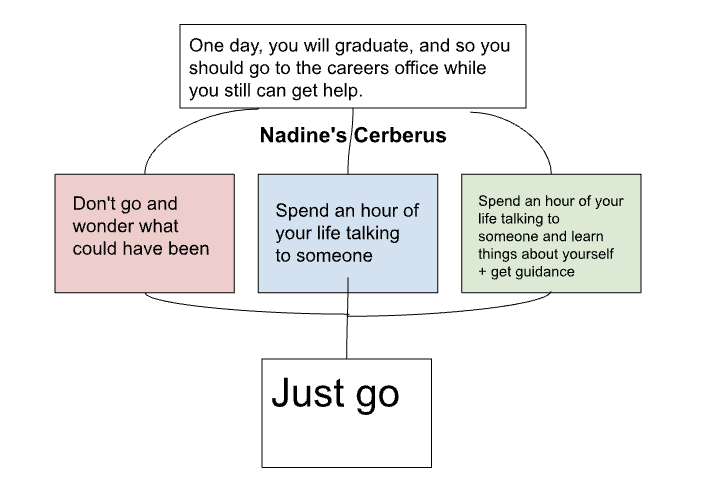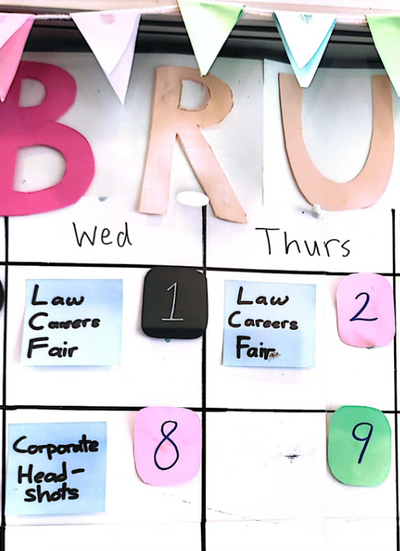As mentioned by my bro, this post is aimed at those (esp Y4) looking to non-law careers.
Despite official denials, many of you are finding it tough to secure a TC. “Pursue other career choices!” they say, and expect you to go job-hunting in the open market with very little institutional support or resources, a baby in a basket on the doorstep. It’s scary, it’s filled with uncertainty, and it’s definitely not what you signed up for when you made the decision to apply to NUS law.
I’m here to help! 4 years ago, I graduated from NUS Business. I had to look for a job on the open job market. I aced some interviews, but, perhaps more importantly, I flunked a couple. I’m no interview expert, but I think some of you might find the following helpful!
Note: this post is timely for peeps in my matriculating batch (the current Year 4s) who haven’t secured TCs. For the Year 3s, concentrate on your TC hunt for now, but this post will be useful to you next year!
In this post, I will cover the following questions:
- What should I apply for?
- When should I be applying?
- How do I prepare for an interview/assessment center?
- How do I do up non-law CV and Cover Letter?
- How much should I be expecting to earn?
Let’s get started!
PART I. WHAT SHOULD I APPLY FOR?
For those of you who don’t have a burning passion in life, a family biz, or stacks of Daddy’s cash or connections to give you a headstart somewhere, this may be overwhelming. Don’t despair- there are lots of great options! My criteria for shortlisting these jobs are that (a) They have some cachet (I’ll be realistic here and assume that law grads would hope for something with a nice ring to it at least) (b) They are generalist positions that don’t require technical skills (c) They pay reasonably ok (see point 5 later).
Do note that my suggestions are quite biased towards my personal (biz sch) background, and do not represent the four corners of what law grads should be applying for!
I will also state at this point that many of the following jobs I am suggesting ask for “good class honours”. This is a code-word for SECOND UPPER. Now, many of you struggling to find TCs don’t have a 2:1. I’ll be blunt: some employers treat this as a threshold requirement and will reject a 2:2 from NUS law, even though they will interview a 2:1 from a less-selective degree course.
BUT it’s not the end of the world! Most companies process their applications manually, and from what I understand, quite a number are actually flexible when they see a 2:2 from NUS law. For example, 2:2 is viable at SIA for their MA program, if you have supporting things like CCA and a compelling story.
My advice? Just apply. And just put “LLB (hons)” on top of your CV. And put your stellar A level or poly transcripts in front. And make full use of your Cover Letter. More on those later.
- Consider joining the government!
Policy positions in ministries such as MFA, MINDEF, PMO, MTI, MHA and other agencies such as SPRING, EDB, IESingapore, A*STAR, DSTA, PSA, MPA etc hire generalists, i.e. any degree will do. Government work can be rewarding. Being part of something larger, for the greater good of Singapore is something I’ll miss (I was at MFA). Soppy but true! Good English, solid report writing, and a good grasp of current affairs are key skills they value, and I think most law grads do quite well in all 3.
- Management Associate or Management Trainee or Future Leaders, or Graduate programs.
I’ll just call them MA programs. They’re basically where companies hire their future management from. For the guys, a good analogy is OCS. MAs are earmarked for leadership. They typically spend the first 1-3 years rotating around different business units (Marketing, Operations, HR etc), before being put in charge of a team of executives. MA programs are competitive to get into, and most of the applicants tend to be Business school grads. However, most programs accept applicants from all disciplines. MA program interviews tend to have Business Cases and Assessment Centers, which I will touch on in point 3 below (with regard to how to prepare for them).
On MA programs, I would recommend trying for MNCs such as P&G, Microsoft, GlaxoSmithKline, Kraft, Sony etc, as well as GLCs, such as SIA, Singtel, SembCorp, ComfortDelGro etc, because in general larger companies pay better and offer better exposure. As mentioned, these programs can be selective, hiring maybe 5-15 graduates per batch, but, being management roles, provide better career opportunities than vocationalist roles, where you specialize in a single job function.
I should add that there’s absolutely nothing wrong with vocationalist roles (e.g. accounts exec or HR exec). If you’ve got a passion for corp comms, by all means apply for corp comms positions! But if you’re clueless, ceteris paribus, MA positions tend to be more prestigious and coveted than vocationalist ones, and pay better, too.
Compliance departments. Basically, departments that ensure compliance with govt, industry and company regulations. Now, these sound boring, but compliance is a skillset that every large organization will need, so it is transferrable across organizations and, to a lesser extent, industries. In particular, bank compliance as a business sector became a growth area after the financial crisis, and the risk management and tax evasion legislation that followed. Legal training is especially relevant to this field, and many of the regulations would be familiar to those who took modules on banking law (Basel III etc), and although experience is preferred, I’m thinking there may be fresh grad positions as well (I admit this is not my area of specialisation and I’m a bit out of my depth here).
PART II. WHEN SHOULD I START APPLYING FOR INTERNSHIPS AND JOBS?
It varies, so DO YOUR HOMEWORK AND CHECK. GIYF. Some companies and agencies (MFA for example) have year-round rolling employment. Others, especially the MA programs, have annual intakes with specified application windows and closing deadlines. FIND OUT what these are.
But here’s my suggested timeline: concentrate on finding a TC throughout Y3S1, start applying for non-law Summer INTERNSHIPS in Y3S2 (while continuing your TC hunt), and concentrate on non-law JOB applications throughout Y4.
Year 3s SHOULD consider applying for Y3 non-law SUMMER INTERNSHIPS. Again, do your homework on the structured internship application windows for each firm, but in general, apply about 6 months in advance for these, so at the end of Y3S1. If you haven’t secured a TC by the close of Y3S1, your Year 3 Summer hols may be better spent doing an internship in an alternative industry rather than chasing that elusive TC with last-ditch law internships. Do note that internships in other industries generally last at LEAST 6 weeks, and most last ~10 weeks, so don’t expect to do more than 1. Choose wisely!
As to the actual jobs, you should look to apply for them in Y4S1 and Y4S2. Firms outside of law hire 6 months to 1 year before their structured programs start, and up to 1-2 months before for vocationalist or vanilla exec positions. Try to secure a job before graduation- sitting at home jobless after graduation applying for jobs can be demoralizing.
Also, note that many organizations, firms and MA programs have upwards of 4 selection rounds, and the whole process can take up to 2 months for some firms. I recommend sending AT LEAST 3-5 applications PER WEEK. If just 10% of them reply and each has 4 rounds, you could find yourself with 16 interviews over 2 months! Interviews are like a 5MC module, and once they start coming in, expect to attend 2-3 interviews a week, with the requisite prep time factored in.
Another piece of advice: Apply to as many as you can, and go for as many interviews as you can. Nevermind that it’s some industry you may not be interested in. Interview skills are picked up through EXPERIENCE. You’re sure to screw up your first interview, trust me. I did. And it was for a job I really, really wanted then. So, make sure the interview for your dream job is NOT your first rodeo!
Also, this is probably anathema to some in the legal industry, especially amongst the old-school partners, but you shouldn’t stop your job search after you get your first non-law offer. Outside of the legal industry bubble, there isn’t a TC honour code. Graduates shop around for offers, and companies know that. You may ask for some time to consider the offer, or agree verbally and back out before signing. I think it’s not very nice and I personally wouldn’t do it, but I’ve seen some even go back on signed offers with signing bonuses (they returned the money of course) for better offers.
Lastly, subscribe to email blasts from the NUS Career Center (not just the law school one), and attend the Career Fair 2017 in Feb. Shove your CVs to anyone and everyone, and try to make an impression on the recruiters. Make a business card if necessary, cos some don’t take CVs there, but they sure will accept a card (NUS Business makes them for free for Bizad grads, you guys should ask the law careers office to consider doing the same for Law grads). Follow up with an email, if you got the namecard of the recruiter.
PART III. HOW DO I PREPARE FOR AN INTERVIEW/ASSESSMENT CENTER?
Unlike law, where you are likely to get just ONE interview to land that TC, in most other jobs, there will be many rounds of interviews, and some will include Assessment Centers (No, these aren’t similar to tuition centers!)
Firstly, what do the rounds comprise of? Typically, in most large organizations, the first round of interviews will be a general “winnowing” stage, where HR ppl will interview large numbers of candidates, sometimes in groups. Assessment centers may then be conducted by HR to test for certain competencies. Subsequent rounds usually involve interviews with or presentations to middle or even senior management to evaluate your analytical and/or presentation skills, and final rounds will usually involve senior management having a less formal chat with you to see if your personality is a fit for the organization.
So, how do you impress? Well, you should prepare for the interview by DOING YOUR HOMEWORK. Read the company webpage THOROUGHLY. I failed an interview once cos I didn’t know the founder’s name! Look for news about the company, news about the industry. Who are its main competitors? Is the industry doing well or badly? If possible, what’s the job scope like, and are you prepared for it (e.g. are you prepared for shift work, attention to detail, overseas postings, working weekends etc)? Also prepare for sure-ask questions like, “why do you want to work at Sony?”, or “what makes you a good fit for the advertising industry?”, and of course, “why should we hire you?”.
At minimum, spend at LEAST 3 hours reading up about the company and industry the day before an interview.
Assessment centers. So these vary from company to company, but basically they’re 2-6 hour sessions, usually held in training rooms or computer labs in the company. They feature problem-solving exercises designed to test specific vocational skills HR thinks you’ll need. For banks, for example, ACs may involve timed arithmetic problems, MA programs may involve business cases (more in a moment), and certain government jobs may require you to do IQ or grammar tests, or prepare sample reports within a set time limit.
Business cases. In particular, MA programs are, after all, looking for management material. Many will give you a business case, for which you have to prepare a response strategy to present to management within a set time. This tests your presentation skills as well as business analysis.
Here is a short sample business case:
https://cb.hbsp.harvard.edu/…/do…/TwC_online_resource_01.pdf
Here is a bunch of VERY short business cases with short sample answers
http://www.consultingcase101.com/tag/free-sample-case/
And here are two business cases which are of the typical length found in case competitions (and some interviews):
https://mitsloan.mit.edu/…/…/Pages/Nissan-Motor-Company.aspx
https://mitsloan.mit.edu/…/C…/10-103%20Conexia%20Lehrich.pdf
Look around online or ask your business school friends for help in preparing for interviews with business cases. Not all interviews have them, but a lot of MA program interviews do.
PART IV. HOW DO I DO UP A NON-LAW CV AND COVER LETTER?
A cover letter accompanies your CV. ALWAYS send your CV with a cover letter, even if the website only asks you to “email your CV to the HR dept”. Noob mistake I’ve made before.
It’s supposed to tell the recruiter why they should hire you. Convince them in one page or less. Aside from the pleasantaries that you can glean from online templates, a Cover Letter should state why you chose the company and/or industry and what skills or experiences you have that you think would make you suitable for the job.
What some people don’t realise is that the Cover Letter is also an opportunity for you to guide the recruiter through your CV. The Cover Letter and CV should not be viewed in isolation. WEAVE a story! Tailor your CV and Cover Letter to the organization. Take the recruiter through your most salient achievements in your CV, and explain any interesting, odd or weak entries. For example, instead of leaving the recruiter to draw adverse inferences on a gap in your transcripts, highlight that you took that sem off to train for some SEA games event, which you won Silver for (ok, exaggerating, but you get the idea). Of course, weave it into how you learnt perseverence or somesuch and how that is a valuable trait you bring to the table. Or if you interned in a bank and you’re applying for a compliance job, highlight that in your Cover Letter, and don’t just leave it to the recruiter to stumble upon it when perusing your CV.
As to the CV, there are two schools of thought. Some say 1 page, some say 2. I think either is fine, but personally, I think 1 page is better (but no more than 2!). Less is more, and recruiters are always swamped. Unless you’re some superstar prodigy, chances are the 3 most dazzling entries in each category (Academics, Work exp, Leadership, Awards, Hobbies/others) will be enough for the recruiter to know what they need to. The next 5 entries are probably much less impressive anyway- winning that storytelling competition in primary 2 probably adds nothing to your chances of getting hired!
PART V. HOW MUCH SHOULD I BE EXPECTING TO EARN?
This is touchy, but I think that, in expecting you to “temper” your expectations, it would be helpful to know what these expectations are.
First off, $4,000 – 5,000 starting pay may be pretty common in law. Elsewhere, this is considered high. Very high.
As a benchmark, a 2015 NUS Business grad started at, on average, $3,341 per month. This is just that- an average. The average marketing grad without honours probably made closer to $2,300, whereas the average Finance 2:1 who started in a mid-office position at a bank started closer to $4,300.
The MA programs I talked about just now? They range between $2,700-$4200. You’ll have to check individually, but for example I heard Sony’s Fresh Minds (I don’t think they’re hiring this year) started below $3,000 in 2012, while Unilever’s Future Leaders started above $4,000. DON’T ask the interviewers, of course, but ask around your business sch friends. If the culture hasn’t changed, rumours about starting salaries in various firms and industries aren’t nearly the taboo topic they are in law school.
For public service, starting pay is pegged to your class of honours unfortunately. Expect to earn $3000 or so less for a 2:2. But the good news is stat boards and ministries pay well. They generally start around $3,300, and some (EDB, MOF, MTI and MFA) can even go above 4 with a 2:1. For the Singaporeans, you may want to apply to be a spook. Can’t say more, but that job pays well. VERY well.
For the girls, some organizations (including the civil service) pay $200-400 less than the guys, cos of NS. At annual salary increments of $100-200, your 2-year headstart works out to about that, so don’t sweat it, you’re still ahead of your peers! But do be prepared for this starting disparity.
Lastly, help each other out. By my reckoning, some 50 of you per batch (about 20% of the cohort) will face issues securing TCs. This is a lot, but a drop in the pond for all the thousands of jobs out there. For most of you, you stand more to gain SHARING news of opportunities than hoarding it. Apply together and exchange tips! That’s how it was done when I was in business school, and it made the job hunt a lot more bearable than the fearful, secretive world of law TC applications.
Hope this helps, and all the best in your job hunt!
For more information on TC applications, head over to Part I of this series!!
Written by: Daniel Ling






